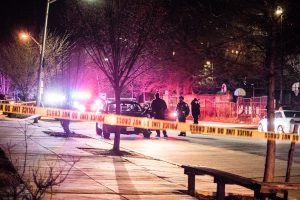Elijah Cummings’ voice was the sound of conscience come tolife. That voice cut through the standard bureaucratese of political Washington– the deadening, cynical, obfuscating, lying, soul-deadening voices of theWhite House and Capitol Hill – and connected all who would listen to someremembrance of our nobler selves.
“We’re better thanthis,” he kept telling us.
That voice called to us during the Freddie Gray rioting,when Rep. Cummings walked the streets of chaotic West Baltimore, bullhorn inhand and tears running down his face as he pleaded for calm.
And the voice called to us in the wake of the southernborder outrages, when we learned of the mistreatment of immigrant children. We’re better than this, Cummings said.
Those words were explicit then, but it was the same messagehe brought so consistently, across a dozen terms as a U.S. congressman, that theybecame a kind of anthem from his lips: We’rebetter than this.
And now the voice is gone. Dead at 68, the news arriving –not without a certain grim expectation — as we awoke this morning, Oct. 17.He’d been sick for a few years and, as he put it more than once, “living onborrowed time.”
Two years ago, Cummings was hospitalized for two months froma heart valve replacement. More recently, he used a walker or a motorizedscooter to get around Capitol Hill. He was increasingly gaunt and frail, butunwavering in his beliefs.
And he went home to West Baltimore at night – the sameundernourished West Baltimore that a bullying president characterized in theugliest ways he knew how, because he and Cummings were locked in battle.
Cummings made the mistake of thinking Donald Trump might be“better than this.” Trump made the mistake of thinking Cummings would shrinkaway.
No chance, in either case. Cummings was a child of the greatpost-war civil rights movement, where he’d seen faces of anger up close.
He grew up in South Baltimore’s tough Sharp-Leadenhallneighborhood. His early schooling was racially segregated. On Labor Day 1962when Cummings was 11, he was one of a couple dozen black kids sponsored by theSouth Baltimore Recreation Center to peacefully integrate the “public” swimmingpool at Riverside Park.
There were about a thousand whites there. Some had adark-skinned doll, which they stomped on. Then, in case the black kids didn’tget the message, some of the whites began throwing rocks and bottles. One ofthe bottles struck young Elijah in the head. It took a hundred city cops andtwo dozen K-9 dogs to calm things.
To the end of his life, Cummings could point to the spot onhis forehead where the bottle clobbered him.
But he never embraced bitterness. The son of sharecroppers,he was a man of deep faith.
Two decades ago, at the heart of the Bill Clinton-MonicaLewinsky scandal, I ran into Cummings near his West Baltimore congressionaldistrict. He said he’d been with Clinton a few days earlier.
“He pulled me and [New York Rep.] Charlie Rangel aside,”Cummings said of Clinton, “and he asked us to pray with him.”
“What did you pray?” I asked. “The Lord’s Prayer?”
Cummings laughed aloud.
“Lord’s Prayer?” he said. He reached out his hand and laid it atop my head. “My daddy and mama are both preachers,” he said. “Man, I can pray.”
In the White House, he said, he put his hand on Clinton’s head, and he asked God for strength to survive a difficult time.
“That’s what we were taught at home,” he said. “Every piece of life is part of your journey, but ask for the strength to deal with it. Be strong, bear your burdens. Stay steadfast in your efforts to see the big picture.”
For those who lost their way, he was there to declare, “We’re better than this.”

A former Baltimore Sun columnist and WJZ-TV commentator, Michael Olesker is the author of six books, most recently “Front Stoops in the Fifties: Baltimore Legends Come of Age” (Johns Hopkins University Press).





